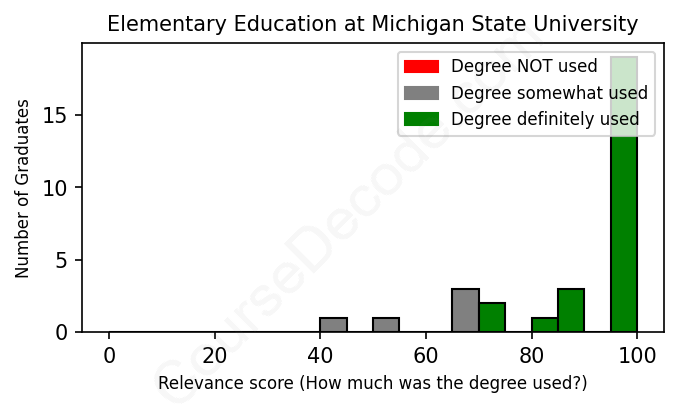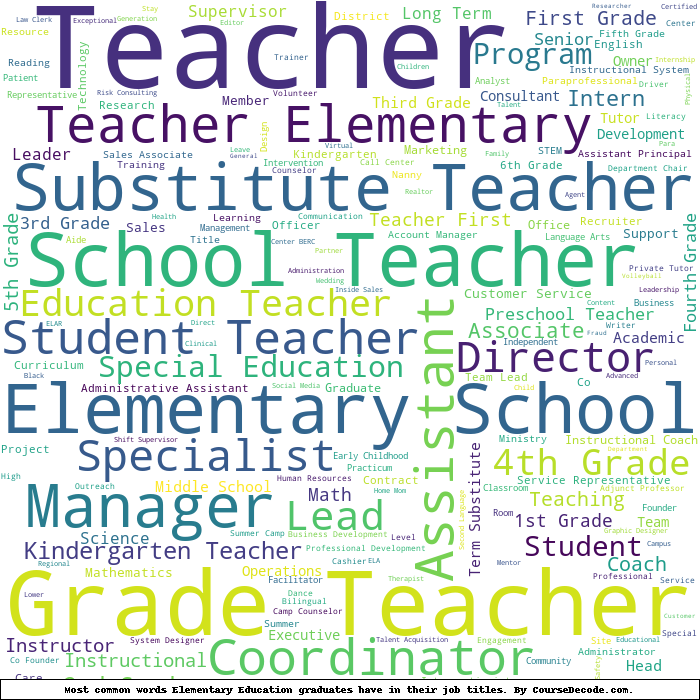
First, some facts. Of the Elementary Education graduates from Michigan State University we've analyzed , here's how many have used (or NOT used) their degree in their career:

These are estimates based on AI analysis of 30 LinkedIn profiles (see below).
The verdict? Great! Overall, with an average relevance score of 89%, Elementary Education graduates from Michigan State University have a substantially higher likelihood (+22%) of finding work in this field compared to the average graduate across all fields:
And for comparison, here's the chart for all profiles we've looked at across all degrees.
Also, after graduating, 53% of these graduates have pursued further education other than another Bachelor's degree (such as a Masters degree or other), compared to the average across all profiles of 35%. This suggests you may need more than just a Bachelors degree to be competitive as a Elementary Education graduate.
See the details:
|
Relevance score: 100% We think this person has gone into a career highly relevant to their degree. We think this person has gone into a career highly relevant to their degree.
DEGREE INFOGraduated in 2012 from Michigan State University with a Bachelor's degree in Elementary Education. No other secondary education since. JOB HISTORY SINCE GRADUATIONTeacher Intern Waterford School District Sep 2012 - May 2013 Fifth Grade Teacher  Wake County Public School System Jul 2013 - Present ABOUTNo information provided. |
The top 10 most common jobs done by the graduates we've analyzed (ranked most common to least) are:
Here is a visual representation of the most common words in job titles for Elementary Education graduates (this is across all Elementary Education graduates we've analyzed, not just those who went to Michigan State University):

Looking at the career trajectories of graduates from Michigan State University's Elementary Education program, it’s pretty clear that many of them kick off their professional journeys as classroom teachers right after graduation. Most of these folks are starting out in elementary school teaching roles, often in institutions like National Heritage Academies or local public schools. Over the first five years, a lot of them seem to stay within the education field, either moving to different teaching positions, taking on responsibilities like Academic Specialist roles, or transitioning into leadership positions such as Instructional Coaches or Curriculum Directors. These moves indicate a commitment to education and a desire to advance within the system.
Fast forward to ten years after graduation, and you’ll find many alumni have solidified their careers in education. They are often well-established, holding titles such as 8th Grade Science Teacher or Assistant Directors of Special Education, while some venture into related fields like instructional design or talent development. While there are a few that have migrated out of traditional teaching roles into more administrative or corporate settings, the majority maintain a strong link to education, suggesting that the degree is serving them well. Overall, it looks like graduates from this program typically enjoy successful paths in education, reaffirming the relevance of their degrees and their passion for teaching young minds.
Getting a Bachelor’s degree in Elementary Education at Michigan State University, or really anywhere, can be a bit of a mixed bag. On one hand, if you love working with kids and have a passion for teaching, the coursework might feel pretty engaging, but on the other hand, it does require a lot of dedication and hard work. You’ll have to juggle classes focused on teaching methods, child development, assessment strategies, and maybe some classroom management techniques, plus there’s often a hefty fieldwork component where you get hands-on experience in real classrooms. So, while it’s not necessarily the hardest major out there, it definitely has its challenging moments, especially when you’re balancing theory with practical application. Overall, it’s probably a bit easier than, say, engineering or some science majors, but it’s still no walk in the park if you want to ace it!
Most commonly, in the LinkedIn profiles we've looked at, it takes people 4 years to finish a Bachelor degree in Elementary Education.
Looking at these MSU graduates, it seems like a mixed bag when it comes to making decent money. Most of them are sticking it out in teaching jobs, which, let’s be real, don’t always pay the best—especially in the early years. For instance, many of them started as teachers right after graduation with modest salaries, and while they may have moved up the ladder, like taking on roles as specialists or instructional coaches, it’s still likely not breaking the bank compared to other fields. A few have ventured into more lucrative roles, like marketing or tech positions, but overall, if they’re primarily in teaching, they might not be rolling in the dough. So, in short, while they’re probably making a stable living, it doesn't look like a whole lot of them are getting rich off these jobs.
Here is a visual representation of the most common words seen in the "about" section of LinkedIn profiles who have a Bachelor degree in Elementary Education (this is across all Elementary Education graduates we've analyzed, not just those who went to Michigan State University). This may or may not be useful:

Here are all colleges offering a Bachelor degree in Elementary Education (ordered by the average relevance score of their Elementary Education graduates, best to worst) where we have analyzed at least 10 of their graduates: